Dental Implants Richardson
Replace Missing Teeth Seamlessly
Tooth loss due to decay or disease is a common problem for many people. The result is usually a loss of confidence as well as adverse changes to the facial structure. Tooth loss also results in serious dental health issues, including gum problems and a deteriorating jawbone. Thankfully, there is a way to replace missing teeth seamlessly without using conventional bridges and dentures. Dr. A and the rest of our experienced staff at Canyon Creek Family Dentistry of Richardson are equipped to provide their patients with dental implants in Richardson.
Learn more about dental implants and what Canyon Creek Family Dentistry of Richardson can do for you and the health and appearance of your smile below. Call our Richardson office for an appointment today!
Why Choose Canyon Creek Family Dentistry of Richardson for Dental Implants?
- Dental Implants Placed & Restored In-House
- Dentist with Nearly 20 Years of Experience
- 3D Cone-Beam Imaging for Precise Dental Implant Placement
What are Dental Implants?

Dental implants are small titanium posts that are surgically placed in the jawbone to act as artificial tooth roots. Titanium is a biocompatible material, which allows the implants to fuse to the jawbone. This creates sturdy supports for the dental restorations. The type of restoration you need will directly depend on the number of teeth that you’re missing.
After about 3 to 4 months of healing, the implant can be mounted with an abutment—an attachment that connects the implant and the restoration. The last part of the dental implant is the restoration. This is a crown, bridge, or denture than is mounted on top of your implant(s) to complete your smile. The result is a beautiful, confident, and strong set of teeth. Because dental implants restore your teeth from the roots up, they look, feel, and function just like your natural smile.
The 4-Step Dental Implant Process

Before you begin the complex process of replacing one or more teeth with a dental implant-supported crown, bridge, or denture, we will walk you through the entire treatment plan step by step to help you fully prepare for this smile transformation process. Part of our initial consultation will be planning out the process, including timeline and pricing. While every patient’s tooth replacement plan is different, you can find some of the basics below. When you’re ready to get started with the tooth replacement process, call our team to schedule your dental implant consultation with the Richardson dentist and team at Canyon Creek Family Dentistry of Richardson.
Initial Dental Implant Consultation

The first step to creating your picture-perfect smile is a tooth replacement consultation. During this appointment, we’ll examine your mouth, review your restoration options, and partner with you to develop a plan to restore your smile, including a step by step timeline to help you prepare for your dental implant plan. We may also recommend one or more preparatory treatments, including tooth extractions and tissue grafts, to help you improve your chances for successful dental implant placement.
Dental Implant Surgery

Once your smile is fully prepared and we’ve walked you through your tooth replacement plan, we’ll schedule your implant placement procedure. This surgery is relatively straightforward. We make a small incision in the gum tissue. Then, the implant post is positioned into the jawbone. A protective cap is placed over the implant to protect it throughout the healing process and maintain the shape of the gum tissue until the abutment and restoration are placed.
Dental Implant Osseointegration/ Abutment

Following the placement of one or more dental implants, we’ll need to wait several months to allow the implant posts to fuse with the supportive gum and bone tissues. This process is referred to as osseointegration. Depending on the number of implants and your body’s healing abilities, it can take anywhere from three to six months for implants to fully fuse with the supportive bone and gum tissues. Once this process is complete, we place abutments that will anchor the restorations to the implant posts. After the abutments are in position, we create a design for your dental crown, bridge, or denture that will be crafted by our trusted dental lab team.
Delivery of Dental Implant Restorations

Once we receive the final crown, bridge, or denture from our dental lab, you’ll return to the office, so we can attach your restoration to the implant posts. If we placed a temporary restoration, we’ll begin by removing it. Then, we’ll use screws to attach the crown, bridge, or denture, creating your flawless new smile.
Benefits of Dental Implants

As you contemplate which method of tooth replacement you prefer, you should know the benefits of dental implants in Richardson far outweigh those offered by fixed bridges and traditional dentures. Yes, they can replicate the look of your smile, but with nearly 500,000 dental implants being placed each year, it’s no surprise that more and more individuals are choosing prosthetics that are designed to last longer, look more natural, and provide greater oral health. With a 98% success rate upon initial placement, dental implants can give you a smile that will help you look and feel better and boost your confidence like never before.
Some of the additional benefits you can expect to receive when choosing dental implants include:
Lifestyle Benefits

- The chance to embrace a better quality of life. Denture wearers admit to keeping their prosthetics a secret from friends and loved ones, and they, too, tend to avoid social gatherings for fear of having to smile. However, with implants, you can feel more confident in your ability to speak and eat, and you’ll have a smile that functions just like regular teeth from the root to the crown.
- The ability to eat the foods you love and consume your favorite hot beverages. Unlike acrylic that can easily warp or become damaged because of too much applied pressure, dental implants are strong and stable because of their surgical placement within the jawbone. Not to mention, they allow you to regain your bite force and chewing power.
- Your implants will never fall or slip out of place. Why? Because the titanium material fuses with the bone and surrounding tissue. This is far different than traditional dentures that only rely on your natural suction to remain firmly in place.
Health Benefits

- Dental implants are easy to clean and maintain, making it a much less time-consuming experience each day and night. Dentures require soaking and a more thorough cleaning regime; however, implants work just like your regular teeth, allowing you to stay on top of your oral hygiene more easily.
- The chance to maintain a more youthful appearance because of your facial shape. Dentures do nothing to stimulate the jawbone, which can cause facial collapse to occur over time. However, dental implants mimic the natural structure of the tooth, continuing to offer stimulation to the bone each time you chew or bite. This keeps your facial shape from changing and allows you to maintain a fuller, more vibrant aesthetic.
- The ability to prolong your life because of the connection between tooth loss and lifespan. Those without teeth by the time they reach the age of 65 are more likely to develop serious health problems that can have a negative impact on their lifespan. By replacing these teeth, you can minimize the risk of osteoporosis, diabetes, and cardiovascular disease, among many others.
Long-Term Benefits

- Choosing to see a trusted dentist in Richardson for implant placement will prove beneficial in the long run because implants are known to have a 90-95% success rate after 10 years.
- The realization that you’ll save money in the long run by choosing dental implants. Not only will you not need regular relining or replacement prosthetics, but you’ll save money on avoiding dental adhesives and special cleaning products.
- The ability to enjoy your newer, healthier, more beautiful smile for a lifetime with proper care and maintenance.
Who Dental Implants Can Help

Whether you’ve lost a single tooth or you have far more severe tooth loss to address, there’s a good chance dental implants can do so without much concern. Canyon Creek Family Dentistry of Richardson is prepared to restore your smile to the fullest extent and give you the one-on-one attention you deserve. During your consultation, we’ll examine your smile and create a treatment plan that’s personalized to your specific needs. To learn more about how the process works and what makes a good candidate for dental implants, give us a call or keep reading!
Who is a Good Candidate for Dental Implants?

Thanks to advancements in the field, more people than ever are eligible to receive dental implants. However, there are certain qualifications you should meet to ensure the most successful treatment possible. Patients should have:
- Positive oral health – If you have gum disease or cavities, they will need to be attended to before treatment can begin.
- Good overall health – You should be healthy enough to undergo minor surgery. Those who cannot need to consider other solutions to replace teeth.
- Jawbone density – The jawbone needs to be thick enough to receive a dental implant effectively, which means those that don’t have enough jawbone available may need to undergo a bone graft ahead of treatment.
Missing 1 Tooth
Dental implants are strong enough to hold their own dedicated restoration. In the case of a single implant, a crown is attached. Implants are made from titanium and don’t rely on neighboring teeth to remain stable, making them a more reliable and longer-lasting solution compared to dental bridges. As part of the process, we’ll design your crown to blend in with existing teeth. This means the color, shade, and size will be taken into consideration to make your smile as natural-looking as possible. In fact, you may find it difficult to remember which tooth it was that you had replaced!
Missing Multiple Teeth
In the event that two or more teeth are missing, an implant bridge can be attached to a pair of dental implants. Unlike traditional dental crowns and bridges, there’s no need to alter existing tooth enamel just to replace teeth in this way. At the same time, you can fill the gap that exists within your smile and prevent neighboring teeth from shifting out of place as a way to compensate. If there are many consecutive teeth missing, keep in mind that a partial implant denture may be needed instead.
Missing All Teeth
It doesn’t matter if you’ve lost all of your teeth, dental implants can hold a full denture with relative ease. If you already use a denture, you’re likely aware that it can easily slip out of place and lead to some very awkward situations while eating or speaking. Implant dentures combine the comprehensiveness of dentures with the reliability and longevity of dental implants. In most cases, about four to six implants are placed in order to ensure the best stability.
Understanding the Cost of Dental Implants

Dental implants are a true investment in your oral health. Although many patients may claim that dental implants cost more money than they are willing to spend, you must think about the benefits of dental implants. They are a life-long tooth replacement solution that provides newfound stability, aesthetics, and improved overall oral health. The cost isn’t even the implant itself; it’s the time, expertise, and resources that are required to successfully place an implant that determine the cost.
If you would like to learn more about dental implants or how to make them an affordable option for you, feel free to contact our office to discuss our various financial options.
Types of Dental Implants
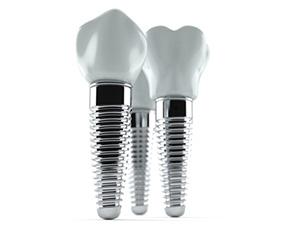
One of the main factors behind the cost of dental implants is the specific nature of the treatment. For example, a single dental implant accompanied by a single crown costs less than several implants and an accompanying denture. There are also different types of implants from different manufactures, as well as a range of implant placement techniques. All of these factors can have a significant impact on the overall price of the treatment. During your consultation, we’ll discuss the details of your procedure with you and talk to you about any implant options that may be available for you.
What Are the Stages of Dental Implant Treatment?
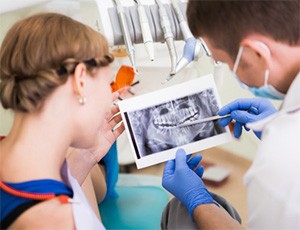
You do not have to pay for the entirety of your new smile upfront. The treatment takes place over several months and across several stages, each of which comes with a separate cost. You’ll thus be able to plan financially to pay for your new smile one procedure at a time. Some of what you may have to pay for includes:
- Preliminary work, such as bone grafts, extractions, or gum disease treatment
- The implant placement surgery
- Abutment placement (abutments are the small pieces that connect implants to the final restoration)
- Design and placement of the final restoration (a crown, bridge, or denture)
Are Dental Implants Worth the Investment?

Yes, dental implants are worth the investment! They have the potential to last a lifetime, while alternative treatments may last for just a few years — a fact that makes implants a better long-term value. Moreover, it’s impossible to put a price on the benefits that dental implants offer. For example, unlike other treatments, they are sturdy enough to stand up to practically any food. They also look stunning and provide bone health benefits. The vast majority of people who receive dental implants have no doubt that their restored smile was worth the cost.
Does My Dental Insurance Cover Dental Implants?

More and more dental insurance companies are offering coverage for dental implants; you’ll have to check the specifics of your policy to find out if it will help with your treatment. If it does not cover the implants themselves, it may mitigate the cost of preparatory work or the cost of your final restoration. Low- or no-interest financing from CareCredit may also play an essential role in helping you afford your new smile. Our team will help you explore various resources you may be able to use in order to fit dental implants into your budget.
Dental Implants Post-Op Instructions

Dental implant placement is relatively simple as far as oral surgery goes, but you will still need to give your mouth some time to heal afterward. Post-op instructions will be provided beforehand so that you can prepare for your recovery appropriately. Below, you’ll find a quick review of some of the guidelines you’ll need to follow after having dental implants placed. Call our office if there’s anything else you want to know about the healing process.
What to Do Directly After Dental Implant Surgery

One of your top priorities after dental implant surgery should be to avoid dislodging the blood clot that has formed over the surgical area; otherwise, the healing process could be extended. Do not drink from a straw or smoke during your recovery. You should also make a conscious effort not to touch the area with your tongue or fingers. Instead of spitting, use a tissue to get rid of your saliva.
Common Side Effects When Recovering from Dental Implant Placement

Symptoms like mild discomfort, swelling, and intermittent bleeding are all to be expected after you receive dental implants. They should start to subside after a few days, but if they become severe or last longer than normal, it’s best to call our office to see what our team suggests. In the meantime, you can manage your post-surgical side effects by:
- Taking over-the-counter or prescribed pain medication.
- Holding a cold compress on the outside of your mouth over the areas where swelling has occurred.
- Applying pressure with gauze to stop any bleeding.
Your Diet After Dental Implant Surgery

You should only eat foods that require little to no chewing. Mashed potatoes, yogurt, and scrambled eggs are just a few examples of foods people typically eat after receiving their dental implants. When your mouth has healed, you can slowly start adding other foods back into your diet.
Until you’ve received your final restoration, try to chew away from your dental implant posts at all times. Too much pressure could prevent the implants from properly bonding with the jawbone.
Post-Op Health & Oral Hygiene

Keeping your mouth clean and healthy is the key to a successful recovery after receiving dental implants. Make sure that you’re continuing to brush and floss your teeth at least two times every day – once in the morning and once before bed. Be gentle around the implant site to make sure the blood clot stays in place. Don’t forget to rinse with salt water after meals to protect your smile from infection-causing bacteria.
What to Do After Your New Teeth Are Attached

The last step of the dental implant process is having the final restoration attached to the implant posts. There won’t be any extensive recovery, but you may notice some mild sensitivity at first. Over-the-counter pain relievers can help you stay comfortable while your mouth is getting used to your new teeth.
Maintaining & Caring for Your Dental Implants

One of the best aspects of dental implants is their potential to last for a lifetime. However, they only attain this long lifespan if you take good care of them. That’s right – your new teeth will need to be maintained just like your old ones. In fact, it shouldn’t be very different from regular oral health care at all! While Dr. A will be happy to provide you with the right tools to ensure your smile remains healthy for years to come, below you’ll find five simple tips for practicing proper dental implant care near Carrollton.
Make Oral Hygiene a Priority

The good news is that dental implants are cavity-proof; the bad news is that poor oral hygiene can lead to dental implant failure by increasing your risk for gum disease. Additionally, your remaining natural teeth are still susceptible to decay. That’s why good oral hygiene is still critical when you have dental implants. You’ll need to brush twice daily for two minutes, floss at least once, and rinse with mouthwash regularly. Our team can recommend certain products or brands for you based on your unique oral health needs.
Eat a Healthy Diet

Indulging in a slice of pie or a bowl of ice cream every now and then is perfectly fine, but moderation is key. Sugary and starchy treats contribute to buildup of plaque and bacteria in the mouth, which may cause gum disease, cavities, and dental implant failure. If you want your teeth and gums to stay healthy, make sure that the majority of your daily food intake consists of lean proteins, fruits, vegetables, leafy greens, dairy products, and foods rich in vitamin C.
Break Bad Habits

Dental implants near Carrollton aren’t exactly cheap, so you’ll naturally want to do everything you can to protect the investment that you made in your smile. This includes breaking bad habits that can damage your new teeth. Whether it’s biting your nails, smoking, chewing on pens or pencils, eating ice, or smoking, you’ll need to find a way to kick these habits (sugar-free chewing gum, smoking cessation groups, etc.) if you want your new pearly whites to last.
Protect Your Dental Implants

Playing sports is a great way to stay in shape, but it carries the risk of injuries to your mouth that could damage your implants. Grinding your teeth at night can also harm to your implants, in addition to causing TMJ disorder. In both of these situations, Dr. A can make you a custom mouthguard to keep your teeth and implants safe at all times, whether you’re on the field or in your bed.
Schedule Regular Dental Checkups

Even if you’ve had all of your natural teeth replaced, routine dental checkups and cleanings are still important. Your implant dentist near Carrollton will be able to closely examine your teeth – real and artificial – for early signs of structural or health problems. That way, any issues can be treated as early as possible.
Dental Implant Failure & Salvage

There are many reasons why we often recommend dental implants as the best form of tooth replacement — one of those reasons is the fact that dental implants are successful in more than 95% of cases! Of course, it must be admitted that there is always a slight chance that something could go wrong with your new prosthetic teeth. If you ever start to suspect that all is not well with your implants, give us a call right away. Our expert team will evaluate the situation and design a treatment plan to get your smile’s health and function back on track ASAP!
Learn More About Dental Implant Failure & Salvage
Advanced Dental Implant Procedures
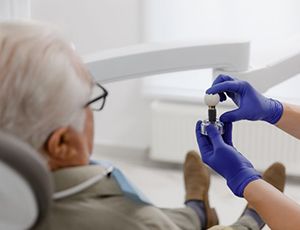
The dental implant placement surgery is often viewed as the centerpiece of dental implant tooth replacement. Yes, it is essential — but in some cases, it cannot be successful unless other advanced procedures are also performed. Here at Canyon Creek Family Dentistry of Richardson, we use our advanced technology and high level of expertise to perform a range of treatments that can support the long-term wellness of your new teeth:
Bone Grafting
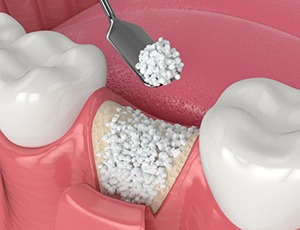
Due to genetics, the passage of time, periodontal (gum) disease, and other factors, your jawbone might not be strong enough and thick enough to accommodate dental implants. Often, we can address this issue with a bone graft procedure, during which we add bone material (which may come from another place in your body, a donor, or an artificial source) to your jaw. After the graft integrates with your bone, it is likely to be strong enough to serve as a reliable base of support for your new teeth.
Sinus Lift
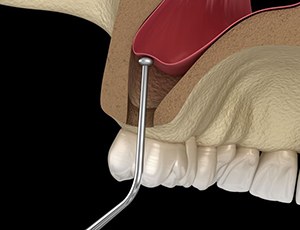
If you need dental implants in your upper jaw, our team will need to verify that the bone is deep enough to accommodate your new prosthetic tooth roots. If it is not, the implants might penetrate your sinus membrane and cause complications.
Fortunately, we can correct a thin upper jaw via a special type of bone graft known as a sinus lift. During the surgery, we carefully access the sinus membrane and push it upward. We then place a bone graft beneath it to keep it in its new position.
Ridge Expansion
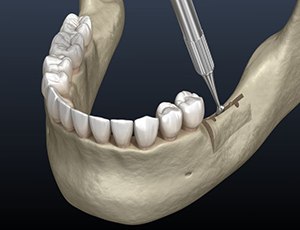
We often say that dental implants get placed in the jawbone, and that is true. However, to be more specific, the implants actually go into the part of the bone known as the alveolar ridge. If that ridge is not wide enough for dental implants, we may have to enlarge it via a procedure known as ridge expansion (also called ridge augmentation).
During the surgery, we must wedge apart the ridge and place a graft between its two parts. Afterward, the ridge should be able to serve as a strong and sturdy base for your dental implants.
PRP/PRF Treatment
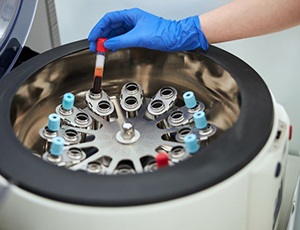
Blood platelets play a massively important role in your body’s healing process. To harness their power, we sometimes perform PRP/PRF treatment. Basically, all we have to do is take a small sample of your blood and put it in a centrifuge in order to separate the part of it that is rich in platelets. Then, we apply the platelet-rich compound at your surgical sites. This simple procedure has the potential to speed up healing time and reduce post-op discomfort.
Gum Grafting
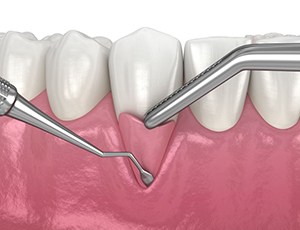
If you had periodontal disease in the past, it likely caused your gums to recede. To restore lost tissue, we may perform a gum graft. There are a few different types of gum grafts, but they all aim to make sure that your tooth roots (and your dental implants) are adequately covered.
Dental Implant FAQs

Replacing teeth with dental implants in Richardson is a complex process and a significant investment. It’s to be expected that you have questions about this potentially life-changing procedure. Below, we discuss some FAQs about dental implants. If you don’t find the information you’re looking for, please contact us so we can personally answer your questions and help you make an informed decision about how you’re going to replace your missing teeth.
Does it hurt to get dental implants?
We strive to make our patients as comfortable as possible throughout their treatment process. During your placement surgery, you’re unlikely to feel anything at all. As you heal, you may experience some soreness and swelling. Medications, along with a soft diet, can help to mitigate any discomfort. After your implants have established a strong bond with your body and your new teeth are in place, they should feel completely natural in your mouth.
Why do dental implants sometimes fail?
Dental implant failure is rare. In fact, the procedure is successful in over 95 percent of cases! When implants do fail, it may be for any of a number of different reasons. Sometimes, it happens because a patient’s body never bonds properly with the implants. In other cases, trauma, infection due to poor oral hygiene, or misuse can cause problems with dental implants.
If you ever suspect that your dental implants are failing — for example, if they feel loose — contact us right away. We may be able to fix the problem before it becomes so serious that it is necessary to remove the implants.
Will people be able to tell that I have dental implants?
Once dental implants are placed beneath the gum line, they become invisible. The restorations that go on top of them — crowns, bridges, and dentures — are made out of high-quality materials that closely resemble natural tooth enamel. Unless you want to brag about how much you love your dental implants, no one has to know that you have them!
How do I take care of dental implants?
Caring for dental implants simply requires that you stick to a good oral hygiene routine that includes brushing, flossing, and rinsing with an antibacterial mouth rinse. If you have a removable, implant-supported denture, you may need to take it out of your mouth to thoroughly clean it. If you have an implant-supported bridge, you’ll need to use a floss threader to clean underneath the artificial teeth. Visiting your dentist in Richardson for a checkup a few times each year is also a key part of maintaining your new smile.
How much experience does your team have with dental implants?
At Canyon Creek Family Dentistry of Richardson, we pride ourselves on the experience and skill of our team members. We have helped many patients to enjoy the benefits of dental implants, and we look forward to helping many more. Dr. Azmoodeh has even undergone specialized training in both implant placement and restoration. If you’d like to learn more about our qualifications, we invite you to contact us.
